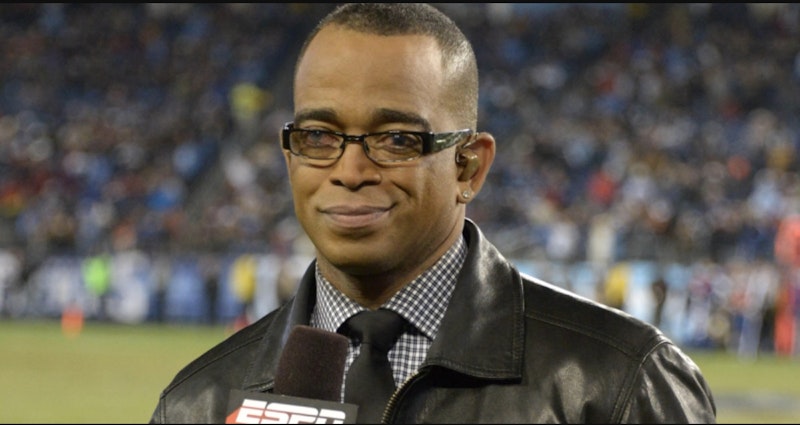Stuart Scott was one of the voices of my generation, yet he’s been silent since 2015. His death was sad, since by all accounts he led an exemplary life, but it was also anticlimactic. Because of a long cancer struggle, he hadn’t seemed like himself for years.
When somebody goes out like Scott did—cut down in what should have been his prime, yet already in the process of being forgotten—you’re never quite sure he’s gone. Every few months, in the throes of insomnia or mania or some combination thereof, I’ll turn on SportsCenter expecting to see him and Rich Eisen trading half-funny wisecracks, only to discover that he isn’t there.
Scott’s absence, which will always come as a surprise, underscores how inexplicably present he was in my life. He was never a hero, although I suppose I inadvertently followed in his footsteps. We were both University of North Carolina alums, veterans of UNC’s school of journalism and media. He worked for the student radio station; I worked for the student newspaper. He lived in Raleigh and was employed by the city’s CBS affiliate until 1993; my family, fractured by divorce, moved to Raleigh in 1996 after my father decided to stop being employed altogether. This continued until 2001, when I graduated from UNC-Chapel Hill and Scott gave the commencement address.
For a few years, Stuart Scott was always with me, if only because SportsCenter was always on in the background: my cousins and I watched it religiously, and the smooth, self-aware delivery of anchors such as Eisen and Scott shaped our generation’s approach to journalism generally. Back then, I wasn’t tired of how slick and clever everything was becoming, and affixing nicknames to obscure NFL players and spouting catchphrases to punctuate slam dunks and home runs still struck me as a vibrant way forward for sports journalism.
And really, there’s no comparing the SportsCenter of 1990-1999 (or so) with the overstuffed, endlessly repeating highlight-cum-gag reel of today or whatever the heck Jemele Hill was trying to do during her time there. Today’s SportsCenter is a copy of a copy of a copy; the SportsCenter of the 1990s tantalized us with potential it never quite realized, because how could it? Scott and Eisen, like sports blogger nonpareil Bill Simmons, didn’t matter because they were good, although they certainly were—they mattered because they were first.
Stuart Scott was 35 when he gave his commencement address, which is five years younger than I am now. UNC-Chapel Hill, which can’t even spell my name correctly on donation solicitations, is unlikely ever to ask me back to share any words of wisdom with its kiddos, so our conjoint narrative ended that overcast day in 2001. For the anchor, the speech offered an early opportunity to assess his outsized yet arguably insubstantial legacy: “Here we go again—I gotta prove something, prove that I’m a journalist and not an entertainer.”
I wrote “arguably insubstantially” there as a way of referencing the arguments of others, not mine. I never begrudged Stuart Scott his success, since he was part of a youth movement that changed the way the journalism game was played. Can he, or anyone else in that movement, be blamed for growing old and dying?
Poor Scott was so busy dying that he never even got to grow old. Other, less innovative people now fill his shoes, borrowing his catchphrases and mimicking his deadpan delivery. “Somewhere down the line, I realized I never have to prove anything to anyone but myself,” Scott explained to the assembled UNC grads. “And I’m secure in the knowledge that I do that every single day.”
History’s neutral, and it refrains from selecting winners or losers; only our thinking makes it so. But for a little while, Stuart Scott—who once took a football to the eye for his art—bestrode his field like a colossus. Some might say that field, sports journalism, was insignificant, and that sports are essentially vacuous pursuits, enjoying exaggerated and unwarranted attention from the millions of empty-headed young people who blithely watch SportsCenter on repeat. Certainly those UNC professors who had objected to Scott’s selection as commencement speaker would’ve said as much.
To the stuffed shirts who continue to make such claims, I can say only: I’m sorry. And here I’m apologizing as a historian who specializes in such matters, not as a pre-teen who came of age with Scott’s dulcet tones serving as top-tier white noise. At a certain point, those people who narrate our lives, whose presences are ubiquitous even if largely unnoticed, have to matter. They have to say something about the world in which we lived, about how who we were led us to become who we are.
Stuart Scott had something to say to us, and it wasn’t “boo-yah, dog.” It was something more, something that’s easily overlooked: He was the harbinger of a profound shift in the way we communicate with one another, in the prioritizing of personal style over content. “Understand the power in your words,” Scott exhorted the class of 2001, my class. “You won’t get it perfect, but you will get it,” he added.
You’re missed, Stuart, especially when I reach for the remote, channel-surfing to ESPN and imagining you’ll still be there. Ave atque vale and all that.

